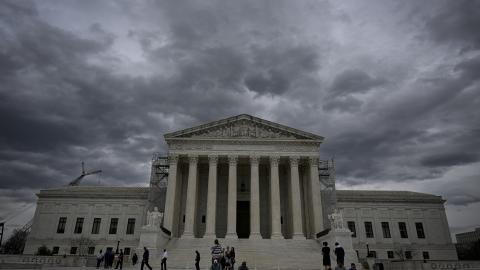Fifth time’s the charm. At least that’s what the Federal Communications Commission appears to believe.
This week, the FCC released a draft order that, when approved later this month, will reinstate so-called “net neutrality” rules. In so doing, the FCC will be remounting a roughly twenty-year-old crusade to take a Roosevelt-era set of laws that regulated the Ma Bell telephone monopoly and apply them to the Internet.
Anyone who lived through the latter half of the 2010s is intimately familiar with “net neutrality.” To many millennials, it was a borderline human rights issue. Free speech was supposedly at risk. Absent regulation, the Internet would have loaded “one word at a time.” A certain HBO comedian made jokes about dingoes and oversized coffee mugs in between pleas to flood the FCC with pro-regulatory comments. Protests were waged. Racist harassment campaigns ensued. Bomb threats were issued. Mass hysteria, just short of dogs and cats living together, commenced.
Yet despite all the sound and fury, nothing of substance followed. Indeed, net neutrality has proven itself to be the archetypical regulatory solution in search of a problem.
In the 2010s, when net neutrality fever was at its apex, video streaming apps like Netflix and VoIP services like Skype were ascendant. Regulators like former FCC Chair Tom Wheeler feared that American broadband providers had “both the economic incentive and technological capability” to limit subscribers’ access to certain online content. Perhaps a seller of both cable Internet and cable TV might throttle its Internet customers’ access to Hulu to persuade them to sign up for TV service. Or perhaps rather than use Skype to make international calls, that same cable company might prefer its customers subscribe to a bundled phone service of its own.
Of course, none of these fears materialized. That’s because competition among broadband providers was, and remains now more than ever, alive and well. Thanks to new and improved 5G networks, many Americans enjoy even more intense competition between cable, DSL, and fiber-optic providers; mobile and home 5G wireless options; and low-earth-orbit satellite services. This competition isn’t just theoretical. If you’ve watched any TV ads lately—particularly during sporting events—these companies are clearly aware that they’re competing with one another.
Additionally, there’s been no evidence of the type of harmful conduct feared by regulatory proponents. To the contrary, even during a global pandemic when many Americans were forced to work from home—when broadband providers arguably had their greatest potential leverage over their customers—American broadband providers didn’t harm anyone. Instead, it was in Europe—with its heavily-regulated broadband sector—where services like YouTube and Netflix were degraded at the behest of government in order to keep European Internet infrastructure afloat. American customers, meanwhile, emerged from the pandemic continuing to enjoy TV shows at full 4K quality.
As for throttling access to, say, Netflix or Zoom to unfairly prop up a cable company’s own video or telephone services? That didn’t happen either. Instead, the video marketplace has become only more competitive in recent years. Netflix, Hulu, HBO, and traditional cable TV compete today with the likes of Apple, Disney, Amazon, and countless other market entrants. Comcast in particular—a company that sells both cable Internet and TV services, as well as creates movies and TV shows—decided to compete with streamers by creating Peacock, rather than degrade or limit customers’ access to this competition. The cumulative result of all of this? Streaming video viewership today outnumbers that of cable and antenna TV.
As for phone service—Zoom, Teams, Webex, FaceTime, and more dominate communications both at home and in the workplace today. They’ve hardly been smothered by cable companies’ bundled VoIP offerings. And if such a concern ever did materialize, in either the VoIP or video space, it likely would be dispensed with thanks to antitrust laws that have been on the books for over a century.
It would be bad enough if net neutrality rules simply proved to be unnecessary. Sadly, they’ve shown themselves to be actively harmful too.
The first and only time in American history when broadband providers decreased investment in their networks, outside of an economic recession, occurred during the reign of net neutrality rules. In an era when America is increasingly committed to closing the “digital divide,” every dollar of potential private broadband investment is important and should not be squelched. More recently, California’s state-level net neutrality rules limited veterans’ access to telemedicine on their phones that they previously were able to access freely and without limits.
Net neutrality proponents have consistently claimed that only their proposed regulations can save the Internet from harm. But precisely the opposite has proved true, time and time again.
Fortunately, the end to roughly twenty years of back-and-forth insanity on this subject may be in sight. The Supreme Court has recently revisited and re-affirmed the “major questions” doctrine, which states that if a particular regulation involves an issue of major economic or political importance, Congress must have clearly delegated the requisite authority in order for the regulation to withstand legal scrutiny.
In the case of the FCC and Title II, the legal mechanism the FCC is using to reimpose net neutrality rules, Congress clearly didn’t intend for a law written in 1934 to grant the FCC authority to regulate the Internet. At least one justice is already on the record as saying so.
Additionally, the FCC’s governing statute dictates that “i[t] is the policy of the United States…to preserve the vibrant and competitive free market that presently exists for the Internet and other interactive computer services, unfettered by Federal or State regulation” and that “[t]he Internet and other interactive computer services have flourished, to the benefit of all Americans, with a minimum of government regulation.” This is hardly pro-regulatory language.
As for the Internet’s economic and political importance—this is beyond self-evident. Today, campaigns for the presidency are won and lost largely online. People entertain themselves, feed and clothe themselves, fall in love, buy houses, work, and even attend school electronically. The impact of regulations that have proved to diminish investment in American broadband would be far more than merely significant.
Perhaps it’s not surprising, then, that in the opinion of two former Obama solicitor generals, new net neutrality rules likely won’t survive Supreme Court review.
If indeed this is true, Sisyphus’s battle with the boulder may finally be coming to an end. The FCC’s roughly twenty-year quest to regulate the Internet will be no more. And American broadband providers, consumers, and the country as a whole will be better for it.



















